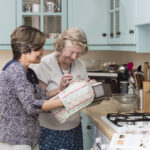Independent Living: Helping Your Loved One Stay At Home
There are ways to support independent living so that your loved one can stay safe in their own home for as long as possible.
Most people take independence for granted, but for many, independent living is more challenging.
Tasks that others might give no thought to – using the toilet, bathing, washing, getting around the home – can be difficult, and that can lead to the question: is it safe, or possible, for my loved one to stay at home?
What is independent living?
Independent living is a philosophy, as much as anything. Arising out of the Disability Rights Movement. The Independent Living movement believes that people living with disability should have the same rights, the same freedoms and the same opportunities as all other citizens.
In the elderly care world, independent living refers to the belief that elderly people should be able to maintain their independence for as long as possible.
In both cases, independent living doesn’t necessarily mean living alone. Rather, it’s about finding ways to support disabled or elderly people to live how they want to.
Supporting independent living – what are the options?
It’s common sense to say that all citizens should have the same rights and freedoms, and that we should be able to provide the necessary support to help achieve that. The majority of people recognise this, and as a result we’re seeing a rise in the number of services and products designed to provide this support.
Home modifications
Home modifications can aid with mobility within the home, and make difficult tasks easier.
They include things like:
- Widening doors
- Installing ramps
- Installing a stairlift
- Improving lighting
- Widening spaces
- Installing a downstairs bathroom
Foundations is the national body for home improvement agencies (HIA). A home improvement agency is an organisation that helps older people, vulnerable people or those living with disabilities to live independently, by ensuring their home is suitable for their needs.
Specialist products
There are hundreds of specialist products designed to help elderly or disabled people live independently in the home.
Some examples include:
- Toilet aids
- Bidet toilets
- Accessible showers
- Shower seats
- Walk-in baths
- Adjustable beds
- Dressing aids
- Special function clothes
- Eating and drinking aids
- Specialist armchairs
- Mobility scooters
The list goes on – anything you or your loved one have difficulty with, there is generally a product that will make that task easier.
Communication aids
There are lots of communication aids designed to help people with loss of speech, hearing or vision.
Low vision aids can be optical (changing how you see) or non-optical (changing the things around you so they’re easier to see). Some examples include:
- Talking clocks
- Auto-focus glasses
- Specialist lamps
- Magnification devices
- Bold print books
- Liquid level indicators
- Voice activated phones
Hearing products can help the deaf or hearing impaired. Options include:
- Hearing aids
- Loops
- Specialist smoke alarms
- Modified phones
- Modified baby monitors
- Visual signaling systems
ACC devices (augmentative and alternative communication) are designed to help assist people in expressing themselves.
These can range from the super simple – a picture-board touch screen – to the more complex, such as speech generating devices that turn typed text into audible sound.
Home care
Care homes are increasingly falling out of favor – as demonstrated by the recent news that Four Seasons Health Care, the UKs largest care home provider, is experiencing financial difficulties.
Instead, the home care sector is growing – making it easier than ever before for elderly people or those living with disabilities to live independently in their own home.
A home carer, or Personal Assistant, provides support in the home as needed, whether weekly, daily or live-in.
With the vast range of products and services aimed at helping support independent living, there’s no reason for you or your loved one to sacrifice living at home. With the right support – whether a personal assistant to help around the home, or modifications to improve mobility – living an independent life is easily achievable.
About HomeTouch: HomeTouch is a platform bringing self-employed home carers together with the people who need care. Our community of experienced care professionals is diverse, with carers specializing in everything from palliative care to disabled care for children, adults or the elderly.




